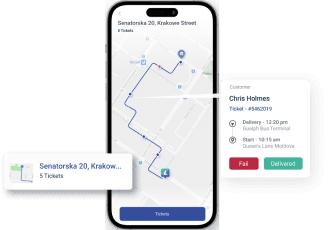TABLE OF CONTENTS

Sign-Up
Enter your email address
GPS tracking technology helps people keep track of their surroundings. Choosing between a GPS tracking app and a GPS tracking device can change your experience. It is important to know the differences between these options. If you want to track family members or fitness activities a GPS tracking app is a good choice. If you need exact location data for cars or valuable items a GPS tracking device is better.
Each option has its own benefits like ease of use accuracy and battery life. This guide will help you look at the main features of both choices. You can then pick what works best for your needs.
What is a GPS Tracking App?
A GPS tracking app uses the GPS on your phone to show real-time location. It is flexible and easy to use. It can also work with other apps to add more features.
- Provides real-time location tracking
- Easy to use and convenient
- Works with other apps for more features
- No need for extra devices
- Flexible for personal or simple tracking needs
What is a GPS Tracking Device?
GPS tracking devices use GPS technology to track and show the exact location of an object or person. It is often used to monitor vehicles, assets, or loved ones in real-time. These devices are built to provide accurate, reliable data, even in remote areas.
- Offers more precise tracking in various environments.
- Designed for outdoor use with a long-lasting battery.
- Independent from mobile networks, works in remote areas.
Compare GPS Tracking App vs. Device to choose the best one
Choose the best option according to your needs. So compare the GPS Tracking App vs. Device with their features.
Purpose:
- GPS Tracking Apps: These apps are great for tracking people or smartphones. They work well for personal use. For example, you can monitor family members, track fitness activities or find lost phones. They depend on the phone’s GPS capabilities. This may limit their usefulness in complex or professional tracking scenarios.
- GPS Tracking Devices: These standalone gadgets are made for specific tasks. They monitor vehicles track high-value assets or provide personal security. Devices like vehicle trackers or asset trackers are designed to be discreet. They allow covert tracking in situations needing high precision. These devices are favoured in business applications like fleet management.
Coverage:
- GPS Tracking Apps: These apps use the phone’s GPS and rely on cellular network coverage. They work best in urban or suburban areas with good network service. They may lose accuracy or stop working in remote regions with weak signals.
- GPS Tracking Devices: These devices connect directly to satellites. This ensures they provide precise location data even in remote areas. Whether you are monitoring a vehicle in a rural area or tracking assets across long distances, GPS devices offer consistent performance without needing a mobile signal.
Battery Life:
- GPS Tracking Apps: Since apps run on smartphones they share the phone’s battery life. Continuous GPS tracking can drain the battery quickly especially when using other phone functions. This can be a drawback if you need long-term tracking.
- GPS Tracking Devices: These devices are made to last longer on a single charge. Many can work for days or even weeks without needing a recharge. Some devices have power-saving modes to extend battery life. This makes them ideal for continuous or extended tracking scenarios.
Accuracy:
- GPS Tracking Apps: These apps can offer good accuracy in areas with strong GPS and cellular signals. They are not as reliable in areas with poor reception or interference like inside buildings or rural environments. Accuracy can vary based on the smartphone’s GPS capabilities.
- GPS Tracking Devices: These devices are built for tracking and offer superior accuracy. They can track within a few meters. They maintain performance in challenging environments like forests or dense urban areas. Devices also provide more reliable real-time tracking.
Ease of Setup:
- GPS Tracking Apps: Installing an app on your phone is quick and easy. Most tracking apps need a simple download from the app store and basic setup. However, some may require ongoing adjustments.
- GPS Tracking Devices: These devices are usually ready to use out of the box. Most come with clear instructions for activation. They are easy to install and maintain.
Real-Time Updates:
- GPS Tracking Apps: Apps depend on your phone's cellular connection to send and receive data. This means updates can be delayed if there are network issues. The frequency of updates can vary based on the app.
- GPS Tracking Devices: These devices provide real-time updates at short intervals. They give constant visibility over the location of the tracked asset. Many devices send instant notifications if there’s significant movement.
How Much Will It Cost You?
Apps are usually less expensive upfront. They may have hidden costs such as data usage fees or premium features. These can lead to indirect costs.
GPS Tracking Devices have a higher initial cost due to the device itself. They can be more cost-effective over time. Many do not require ongoing subscription fees. Their longer battery life means fewer maintenance costs.
Conclusion
When choosing between a GPS tracking app and a device you should think about what you need. GPS apps are easy to use and good for basic tracking. But if you need better accuracy or longer battery life a GPS device will work better. Both options can help you track things or people depending on your needs. It is important to choose the one that fits your situation. This way you get the right level of safety and control.

Aiden mitchell
As a GPS Tech geek, I find Lumyri's transformative impact on GPS technology on businesses and their customers. Real-time tracking information empowers businesses to provide accurate delivery estimates, allowing customers to plan their schedules with precision.



